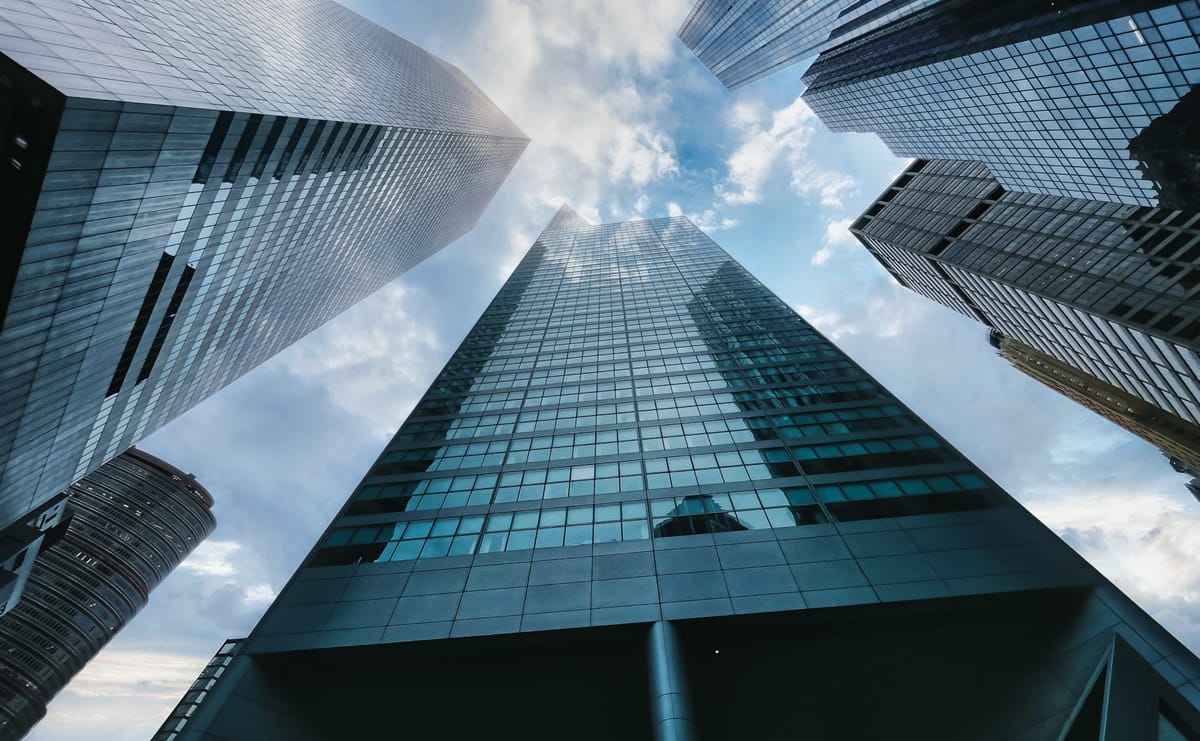
By Michael Pawlyn
Epochal shifts in human thought occur when people lose faith in the worldviews that have prevailed up to that point and become inspired by the emerging ideas of a new era. There are good reasons to believe that we are at a similar juncture now and it worth considering how we might help to bring about that transformation before a series of cascading crises transform society in ways that we may not want.
The scientific revolution was a large part of what moved many people from the traditional era to the modern age. This was marked by a rolling back of the power of the church, an increasing faith in reason and, accelerating in the twentieth century, a sense in which people saw themselves as consumers with individual freedom rather than as subjects to a monarch.
Some point to the 1968 Earthrise photograph as the moment that kickstarted the environmental movement which was a key part of the shift from the modern to postmodern era. The architecture critic Charles Jenks claimed that modernism died on March 16th, 1972, when a large modernist housing block called Pruitt Igoe – completed only 15 years previously – was detonated. There was a growing feeling that the modern project had failed and philosophers talked about ‘the collapse of the metanarratives’ – not just modernism but religion and communism too. One of the big flaws in this epoch of Postmodernism was the attempt to reconcile environmental issues with conventional economics and to persuade us that conscious consumerism could save the planet. Conventional sustainability is very similar in my view – suggesting that, if we can learn to just be a little less bad in everything we do, we can safeguard the future.
So where are we now? Some people in the rich, industrialised nations still hold on to Traditional Stage worldviews but most are in the Modern or Postmodern Stages. Nearly all the big companies now have some kind of sustainability policy and are trying to keep up with rising expectations on the environment and human rights. Hardly any companies had that in 1970. I think we are in the early stages of a shift to the next stage in this model which some pundits refer to as the ‘Integral Stage’. Very few people think that conscious consumerism will save the planet or that ‘less bad’ sustainability will address the planetary emergency. Similarly, very few people aside from conventional economists believe that endless growth is possible. The social philosopher Daniel Schmachtenberger has asserted that "the most dangerous religion in the world today is the naive progress narrative." [[1]] He’s referring to the common tendency to think that the future will continue getting better, there are no major problems with the existing economic system, and that whatever the problem, technology is the answer.
It’s a sure sign that a cultural shift is underway when things that were regarded as progressive start to look very out of date. One area where this is changing rapidly is in our attitudes towards the rest of the living world. If you look around at the glass-fronted offices in a modern city, consider the fact that nearly all of those will have been built to a specification that includes a ‘non-infestation clause’. This is effectively a contractual obligation to exclude all life, other than humans, from the building. Future generations may well look back at this as a low point in our dualistic separation from nature. If we are serious about aligning humans with the rest of the living world then we need to do way better than this. A useful provocation to consider is: How we can maximise colonisation of buildings by nature?
I sometimes ponder with friends on what ideas are commonplace today that future generations will regard as astonishing. For instance, anyone that has grown up with animals – particularly dogs – knows that they demonstrate a whole range of emotions: excitement, fear, love, shame and more. So how did it take the UK until 2023 to officially recognise that animals are sentient? [[2]] Another unfathomable aspect of our current reality is that conventional economics – the pervasive discipline that has come to control so much of modern life – treats the whole of the living world apart from humans as an externality. How could it have occurred that in 2024, seasoned politicians and policy-makers accepted that we were on course to destroy the only living planet we know and yet seemed at a loss to conceive of an alternative approach? [[3]] Why did no journalists on major news networks challenge economists or politicians on the clear impossibility of endless growth? Staggering.
The writer Mark Stevenson has asserted that new ideas generally pass through the following four stages of acceptance: 1. “That’s not even an idea”, 2. “OK, it’s an idea but it’s so left-field you’re basically mad”, 3. “OK, it’s an idea, but not one that works in ’the real world’” and finally, 4. “I always thought that was a flipping great idea”. The early proponents of ecological economics like Herman Daly and E.F. Schumacher probably experienced a lot of Stages 1 & 2 in response to their ideas that the economy should be regarded as a subset of the biosphere. In a short period of time, British economist Kate Raworth has succeeded in bringing a lot of people through Stage 3 and into 4 with her ‘Doughnut Economics’ idea. Key to her success is a diagram with such unarguable clarity that it persuaded a right-of-centre politician in the Netherlands to buy a copy of her 2017 book for every member of the Dutch parliament.
Raworth is also very good at discerning what roles should be played by the state, the market, the commons, finance, etc. For too long we have been persuaded to believe that everything should be left to the market. It is claimed that one of the characteristics of people in the Integral Stage is that they are able to move beyond the old binaries of left vs right, market vs state, etc. and look back at all the previous stages and objectively draw out the best aspects of each.
If we were to take an objective look at companies, I think we would conclude that they can be dynamic, innovative, self-organising and capable of delivering at scale and speed. They also tend to be focused on growth based on oversimplified short-term economics that externalises damage costs and ignores anything hard to measure. The first set of characteristics are all really useful; the second set are massively dangerous. Part of the problem is that most people subscribe to one or other of those stories but rarely both. While that continues, things are going to carry on getting worse.
Within the realm of ESG (‘Environmental, Social & Governance’) reporting in business, the most common underlying theory of change, which I’m calling the ‘trailblazer theory of change’ could be summarised as ‘Some big companies are demonstrating environmental leadership - they will attract the best staff, cultivate a growing body of conscious consumers and their enhanced performance will persuade the rest of the business world to get on board’. In 2024 this theory of change collapsed. Several of the huge companies such as Unilever, which had been early leaders for ESG took massive steps backwards and many others blamed commercial pressures for curtailing their own efforts. Shortly afterwards, The Cambridge Institute for Sustainability Leadership published a report titled ‘Survival of the Fittest: From ESG to Competitive Sustainability’ in which they stated:
“While the roll-out of solutions is impressive, we are failing to keep pace with the scale of the problem and trends on climate and nature continue to head in the wrong direction. It is time to recognise that the market has failed to deliver at the pace required and there is no realistic prospect that, without much deeper structural changes, market forces will ‘bend the curve’ and protect the social and environmental foundations on which society - and businesses – depend.” [[4]]
The solution I suggest is to acknowledge a role for citizens and governments in creating a level playing field and the right conditions for companies to compete within planetary limits.
Looking at how expectations of companies have evolved over the last 50 years, there was a time when it was considered enough to have an energy reduction and recycling policy. was followed (not necessarily in this precise order) by ethical sourcing, gender and diversity reporting and net zero commitments. This has been a largely cultural shift, backed up by some financial policies and legislation. My prediction is that the next level of expectation will be for companies to have a clear purpose aligned with addressing the planetary emergency and a theory of change for how to achieve it. The reason the second part is important is because it is almost certain to highlight essential system changes that are outside the company’s currently perceived boundary of influence. Given the failure of the ‘trailblazer theory of change’ I believe committed companies now need to collaborate with their competitors to work out what system changes are required for their sector and lobby governments for these to be implemented.
How might we help bring about this epochal shift. I think Donella Meadows had it about right when she was asked ‘How do you shift paradigms?’:
You keep pointing at the anomalies and failures in the old paradigm.
You keep speaking and acting, loudly and with assurance, from the new one.
You insert people with the new paradigm in places of public visibility and power.
You don’t waste time with reactionaries; rather you work with active change agents and with the vast middle ground of people who are open-minded.
Michael Pawlyn has built a reputation as a thought leader in regenerative design and biomimicry. He has lectured internationally and, in 2011, became one of only a small handful of architects to have a talk posted on TED.com which has since had over 2.2 million views. In 2019 he was one of the co-instigators of Architects Declare, his latest book Flourish and podcast can be found here.
[[1]]: https://open.spotify.com/episode/04de8Px8etpfb8jSolwCAf?si=dc501469c2ed4436
[[2]]: There are still many countries including the US that don’t legally recognise animal sentience even though many indigenous peoples have held much broader views of sentience for thousands of years
[[3]]: This is the essence of the interview with Kate Raworth on ‘The Rest is Politics’ podcast presented by Alastair Campbell and Rory Stewart https://therestispolitics.supportingcast.fm/listen/leading/22-kate-raworth-doughnut-economics-and-thriving-in-balance
[[4]]: Hooper, Lindsay; Gilding, Paul (2024). Survival of the Fittest: From ESG to Competitive Sustainability. Cambridge, UK: Cambridge Institute for Sustainability Leadership, Executive summary p3

